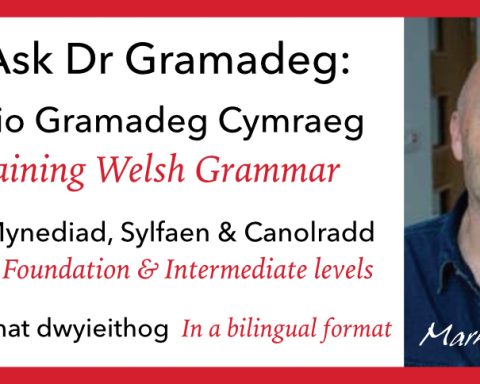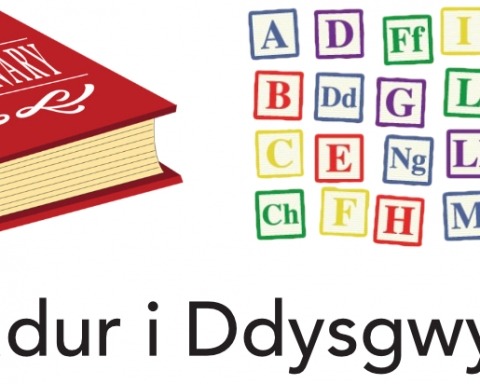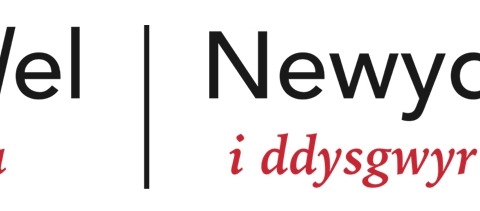I’m hopeless at learning languages!’ ‘Dw i’n rhy dwp i dysgu iaith arall!’ Sawl gwaith ydych chi wedi clywed hynny? Yn aml iawn, mae’n debyg. Ond mae’r bobol yna’n anghywir. Does neb yn rhy dwp i ddysgu iaith arall. Mae hanner miliwn o bobol yng Nghymru’n siarad dwy iaith. Dydyn nhw ddim yn Einsteins i gyd! Y peth pwysig yw dysgu iaith yn y ffordd iawn- dan yr amodau iawn. Yma, mae Robat Powell, y dysgwr Cymraeg cyntaf i ennill cadair yn yr Eisteddfod Genedlaethol (Y Rhyl, 1985) yn esbonio mwy.
‘I’m hopeless at learning languages!’ ‘I’m too stupid to learn another language!’ How many times have you heard this? Very often, probably. But those people are wrong. No one is too stupid to learn another language. There are half a million people in Wales speaking two languages. They are not all Einsteins! What is important is to learn a language in the right way- under the right conditions. Here, Robat Powell, the first Welsh adult learner to win a chair in the National Eisteddfod (Rhyl, 1985) explains more.
| Mae pedwar cam yn y broses o ddysgu iaith arall. Y pedair ‘Ec’, dw i’n eu galw nhw: Cymhelliad – Cyfle – Cyswllt – Cadw ati. Gadewch i ni edrych ar y pedwar cam yma. | There are four steps in the process of learning another language. The four Cs, I call them: Cymhelliad – Cyfle – Cyswllt – Cadw ati. (Motivation – Opportunity – Contact – Perseverance). Let us take a look at these four steps. |
| 1. Cymhelliad. Mae’n rhaid bod rheswm da gyda chi dros ddysgu’r iaith arall. Nid dim ond diddordeb. Efalle eich bod eisie byw mewn gwlad arall. Eisie priodi person sy’n siarad yr iaith. Eisie pasio arholiad. Eisie swydd sy’n gofyn am fedru’r iaith. Ond heb reswm cryf fyddwch chi ond yn chwarae gyda’r iaith yn y pen draw. Y rheswm cryfa i gyd yw eisie dod yn aelod llawn o’r grŵp arall, e.e. dod yn Gymro/Gymraes Gymraeg yn lle aros yn Gymro/Gymraes ddi-Gymraeg. | 1. Motivation. There must be a good reason for you to learn another language. Not just interest. Perhaps you want to live in another country. Want to marry someone who speaks the language. Want to pass an exam. Want a job that requires you to know another language. But without a strong reason you will in the end do no more than play at the language. The strongest reason of all is the wish to become a full member of another group, for example to become a Welsh-speaking person instead of remaining a Welsh person with no Welsh. |
| 2. Cyfle. Rhaid cael cyfle i glywed a gweld yr iaith darged. Cyfle i siarad yr iaith â rhywun arall. Mae mynd i ddosbarth yn help mawr. Ond hefyd mae’n bosib dilyn cwrs yn yr iaith ar-lein neu brynu cwrs sydd â llyfr a CD neu DVD. Y peth mwya pwysig yw cyfle i glywed yr iaith lafar. Y dyddiau hyn mae’r rhyngrwyd yn rhoi cyfle gwych i glywed iaith arall bob dydd. | 2. Opportunity. There must be an opportunity to hear and see the target language. An opportunity to speak the language with someone else. Going to a class is a great help. But it is also possible to follow an online course in the language or buy a course with a book and CD or DVD. The most important thing is to have an opportunity to hear the spoken language. These days the Internet provides an excellent opportunity to hear another language every day. |
| 3. Cyswllt. Mae angen cyswllt â’r iaith lafar a hefyd â’r iaith ysgrifenedig. Cyswllt gyda pherson byw sy orau. Pobol mewn dosbarth neu ffrindiau. Os y’ch chi’n dysgu Ffrangeg yn Ffrainc, e.e., bydd gyda chi gyswllt â siaradwyr o’ch cwmpas chi – yn y siopau, yn y gwaith, ar y bws, ym mhob man. Ond gallwch chi ddysgu’n dda heb gyswllt â phobol. Gallwch wrando ar yr iaith trwy’r rhyngrwyd, y radio, neu ar CD cwrs iaith. Gallwch chi siarad â’ch hunan pan fyddwch chi’n gyrru’r car neu’n aros am y bws. Ond chi sy’n gorfod chwilio am y cyswllt! Fydd siaradwyr yr iaith ddim yn dod atoch chi. | 3. Contact. You need contact to the spoken language and also to the written. Contact with a real person is best. People in a class or friends. If you are learning French in France, for example, you will have contact with speakers around you – in the shops, at work, on the bus, everywhere. But you can learn quite well without contact with people. You can listen to the language on the Internet, on the radio, or on a CD language course. You can talk to yourself when driving the car or waiting for the bus. But it is up to you to look for the contact! Speakers of the language aren't going to come to you. |
| 4. Cadw ati. Dylech chi ddefnyddio’r iaith darged bob dydd, os dim ond darllen am bum munud. Os gwnewch chi hynny, gallwch chi ddysgu pethau sylfaenol iaith newydd yn eitha da mewn rhai misoedd. Ond does neb yn meistroli iaith mewn dau neu dri mis. Mae’n rhaid cadw ati! Mae hynny’n meddwl cadw cyswllt â’r iaith bob dydd am ddwy, tair neu bedair blynedd a mwy. Mewn gwirionedd, dydyn ni byth yn gorffen dysgu iaith, hyd yn oed ein mamiaith. I nesu at safon siaradwr iaith-gynta mae angen tua 1,000 o oriau cyswllt â’r iaith – yn sgwrsio, yn darllen neu’n gwrando arni hi. Os yw’r iaith arall yn defnyddio sgript gwahanol fel Arabeg neu Siapanëeg, bydd angen llawer mwy na 1,000 o oriau i ddysgu ei darllen a’i hysgrifennu, yn ogystal â’i siarad hi. Felly, cadw ati sy’n rhaid! | 4. Perseverance. You should use the target language every day, even if only to read for five minutes. If you do this, you can learn the basics of a new language quite well within a few months. But nobody masters a language in two or three months. You must keep at it! That means keeping in contact with the language every day for two, three or four years or more. In fact, we never finish learning a language, even our mother tongue. To approach the standard of a first-language speaker one needs around 1000 hours of contact to the language – conversing, reading or listening to it. If the other language uses a different script, like Arabic or Japanese, you will need much more than 1000 hours to learn to read and write it, as well as to speak it. So, perseverance is a must! |
Does neb yn meistroli iaith mewn dau neu dri mis; mae’n rhaid cadw ati!
Fy mhrofiad o ddysgu Cymraeg / My experience of learning Welsh
| Roedd y pedwar cam hyn yn glir yn fy hanes fy hunan pan ddechreues i ddysgu Cymraeg yn chwedegau’r 20fed ganrif. Pan es i i Brifysgol Llundain yn ddi-Gymraeg fe glywes i Gymry eraill yno yn siarad yr iaith â’i gilydd. Teimles i’n gryf iawn fod yn rhaid i minnau ddysgu’r iaith i fod yn Gymro cyflawn, a dyna oedd y cymhelliad. | These four steps could clearly be seen in my own story when I began to learn Welsh in the 1960s. When I, having no Welsh, went to London University I heard other Welsh people there speaking the language with one another. I felt very strongly that I had to learn the language to become a complete Welsh person, and that was the motivation. |
| Roedd y cyfle ffurfiol i ddysgu’r iaith yn Llundain yn brin. Doedd dim dosbarthiadau yno. Roedd rhaid i mi greu’r cyfle trwy brynu adnoddau. Rwy’n cofio prynu ‘Teach Yourself Welsh’ gan Bowen a Jones, er mai y llyfrau mwya effeithiol i mi oedd ‘Welsh Made Easy’ gan Caradar. Prynes i’r hen gwrs Linguaphone hefyd – ar recordiau mawr 33rpm! Doedd safon y sain ddim yn uchel, ond roedd y 30 gwers hynny’n help mawr i mi, yn enwedig gartre yng Nglyn Ebwy pan nad oedd neb arall i ymarfer yr iaith gyda nhw. | Formal opportunities to learn the language in London were thin on the ground. There were no classes then. I had to make the opportunity by buying resources. I remember buying 'Teach Yourself Welsh' by Bowen and Jones, although the books I found most effective were 'Welsh Made Easy' by Caradar. I also bought the old Linguaphone course – on 33rpm records. The sound quality was not good, but the 30 lessons were a great help to me, especially at home in Ebbw Vale when there was nobody else to practise the language with. |
| Fy nghyswllt cyntaf â’r iaith oedd y myfyrwyr eraill o Gymru. Yn y flwyddyn gynta roedd tri yn byw yn yr un neuadd â mi yn Llundain. Wedyn symudon nhw mas, ond byddwn i’n mynd i weld myfyrwyr eraill o Gymru mewn neuaddau eraill. Dechreues i fynd i ddwy dafarn lle roedd Cymry’n cwrdd ar nos Sadwrn a nos Sul. Roedd rhaid mynd i chwilio am y cyswllt, ond roedd y cwmni – a’r cwrw – yn braf iawn. | My initial contacts with the language were other students from Wales. In the first year there were three living in the same hall of residence as me in London. Then they moved out, but I would go to see other students from Wales in other halls. I began to go to two pubs where the Welsh would meet on a Saturday and Sunday night. I had to seek out the contact, but the company – and the beer – was very good. |
| Yna, cadwes i ati dros y blynyddoedd. Doedd braidd dim llyfrau mewn Cymraeg hawdd i ddysgwyr ar y pryd. Ond roedd darllen yn bwysig i ehangu geirfa. Darllen papurau’r ‘Cymro’ a’r ‘Faner’ byddwn i. Araf iawn oedd hynny, a rhaid chwilio am gymaint o eiriau yn y geiriadur! Ond mwya roeddwn i’n darllen, hawsa i gyd roedd hi’n dod. | Then, I kept at it over the years. At that time there were almost no books in easy Welsh for learners. But reading was important for expanding vocabulary. I used to read the 'Cymro' and 'Faner' newspapers. It was very slow going, and I had to look up so many words in the dictionary! But the more I read, the easier it all became. |
| A dau beth i orffen. Wrth i chi ddysgu iaith arall bydd siaradwyr yr iaith yn barod iawn i’ch helpu chi. Ond bydd yr onus arnoch chi! Rhaid i chi deimlo’r cymhelliad. Rhaid i chi chwilio am y cyfle a’r cyswllt â’r iaith, a rhaid i chi gadw ati. Does neb arall yn gallu gwneud hynny drosoch chi. | And two things to finish. When you are learning another language, the speakers of the language will be very ready to help you. But the onus is on you! It is up to you to feel the motivation. It is up to you to look for the opportunity and the contact, and it is up to you to have the perseverance. Nobody else can do these things for you. |
| Ond dyma’r peth ola, a’r peth mwya pwysig. Mae dysgu iaith arall yn hwyl! Mae’n rhoi mwynhad mawr. Mwya byddwch chi’n dysgu, mwya i gyd o bleser gewch chi o ddefnyddio’r iaith. A byddwch chi’n ennill parch gan bobol sy’n siarad yr iaith, beth bynnag yw honno, boed Gymraeg, Ffrangeg neu Punjabi. | And there is one final thing, and it is the most important. Learning another language is fun! It gives great enjoyment. The more you learn, all the more pleasure you will get from using the language. And you will win respect from people who speak the language, whatever that language is, be it Welsh, French or Punjabi. |
| Mae gwlad newydd yn aros i chi ei darganfod hi- gwlad eich iaith newydd. Pob hwyl ar y daith! | There is a new country waiting for you to discover- the country of your new language. Good luck on the journey! |
Mae dysgu iaith arall yn hwyl! Mae’n rhoi mwynhad mawr. Mwya byddwch chi’n dysgu, mwya i gyd o bleser gewch chi o ddefnyddio’r iaith.








